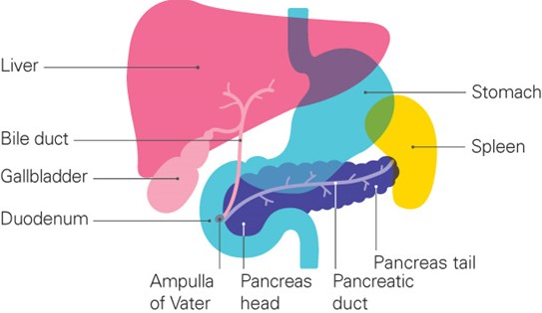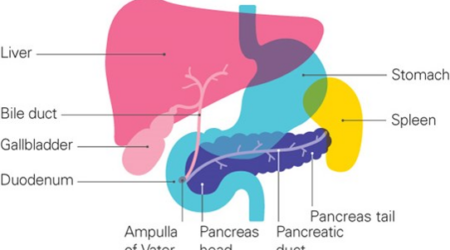How does pancreatic cancer affect digestion and nutrition?
The pancreas plays an important role in digesting food, as it produces enzymes that help to break down food. Pancreatic cancer can reduce the number of enzymes that your pancreas makes. This means that food is not properly digested, and the nutrients aren’t absorbed.
What's in the 'Diet and pancreatic cancer' information section?
- Diet and pancreatic cancer
- How does pancreatic cancer affect digestion and nutrition?
- What symptoms are caused by problems with diet and digestion?
- What is a dietitian?
- Pancreatic enzyme replacement therapy (PERT)
- How do I take pancreatic enzyme replacement therapy?
- What if pancreatic enzyme replacement therapy doesn’t help my symptoms?
- Nutritional supplements for pancreatic cancer
- Coping with the emotional effects of diet symptoms
- Tips for eating well and dealing with digestion problems
The pancreas plays an important role in digesting food, as it produces enzymes that help to break down food. Nutrients from the food can then be absorbed into the blood and used by the body. Different pancreatic enzymes help to break down foods containing fat, protein and carbohydrate.
How does pancreatic cancer affect digestion?
Pancreatic cancer, or surgery to remove the cancer, can reduce the number of enzymes that your pancreas makes. It can also block the enzymes from getting to the duodenum (first part of the small intestine) where they are needed for digestion. For example, the cancer can block the pancreatic duct, which carries the enzymes from the pancreas to the duodenum.
This means that food is not properly digested, and the nutrients aren’t absorbed. This is called malabsorption. It can be managed with pancreatic enzyme replacement therapy (PERT).
The pancreas and surrounding organs

What is diabetes?
The pancreas also produces hormones, including insulin and glucagon, which control sugar levels in the blood. Pancreatic cancer can reduce the number of hormones the pancreas makes, which can cause diabetes. Diabetes is a condition where the amount of glucose (a type of sugar) in your blood is too high.
If you have pancreatic cancer, you might get a type of diabetes called type 3c diabetes. This is different to other types of diabetes that you may have heard of, like type 1 and type 2 diabetes.
There are treatments for diabetes. Your dietitian or diabetes nurse will help you manage it.
“We didn’t know about type 3c diabetes before. Mum had been diabetic for some time and was following a diet/taking medication to manage type 2. The information on 3c really helped us to understand her condition.”
Updated March 2023
Review date March 2025


